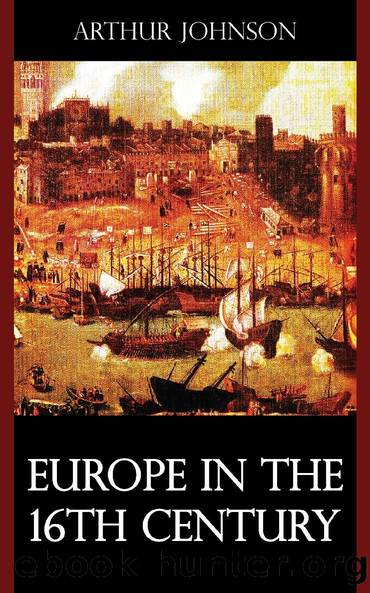Europe in the 16th Century by Arthur Johnson

Author:Arthur Johnson
Language: eng
Format: epub
Publisher: Ozymandias Press
It was now that Ferdinand assumed that attitude which was the outcome of his jealousy of Charles, and of his earlier negotiations with Maurice, an attitude which he was to maintain until the final abdication of his brother. Anxious to protect his own interests and those of his House, Ferdinand proposed to intervene as mediator; to come to terms with the Protestants, and, with a united Germany at his back, defeat the succession scheme of Charles, and turn upon the Turk. Accordingly he induced Maurice to hold a conference at Linz, April 18, at which they agreed upon the general terms of the future peace, and Maurice consented to a suspension of arms on May 26, when negotiations should be resumed at Passau. Charles had authorised his brother to negotiate, hoping thereby to gain time, but the results of the conference were not entirely to his mind, and Maurice had once more gained a diplomatic victory. The neutrality of Ferdinand was practically secured; while Maurice had time to act before the 26th. Marching on the Ehrenberg, he secured the castle which commanded the pass to Innsbruck, where the Emperor was; and Charles, too ill with gout to ride, after a vain attempt to escape northwards to the Netherlands, fled with difficulty in a litter across the Brenner to Villach. Maurice was urged to end the matter by seizing the Emperor himself. ‘I have no cage big enough to hold such a bird,’ he answered, and preferred to treat.
On the 1st of June, negotiations were again resumed at Passau between Ferdinand and Maurice, where the Electors, many of the city representatives, and most of the princes were present. It is sometimes said that Charles, in despair, left the negotiations to Ferdinand, and let things go as they would. Nothing is further from the truth. At no time of his life are the tenacity and obstinacy of his character better illustrated than at this moment, especially when we remember how ill he was. Unwilling to abandon his darling scheme of restoring unity to the Church, and supremacy to the imperial authority, he fought each concession clause by clause; ever dreaming of revenge, he laboured to gain time while he intrigued and tried to organise an opposition on every side. But all in vain. Germany had suffered too much from his rule to care to fight for it again. The political tendencies of the time leant too strongly to autonomy in Church and State; and the Treaty of Passau is mainly due to the growth of a middle party, both Catholic and Protestant, who were weary of war, disliked the political schemes of Charles, and saw the necessity of compromise—a party which expressed the sentiments of Germany at large. On one point, however, the Emperor stood firm. He refused to acknowledge the authority of the conference at Passau as final; to the decisions of a Diet alone would he bow, and the terms granted at Passau must be provisional only. Maurice who, in
Download
This site does not store any files on its server. We only index and link to content provided by other sites. Please contact the content providers to delete copyright contents if any and email us, we'll remove relevant links or contents immediately.
| Africa | Americas |
| Arctic & Antarctica | Asia |
| Australia & Oceania | Europe |
| Middle East | Russia |
| United States | World |
| Ancient Civilizations | Military |
| Historical Study & Educational Resources |
Cecilia; Or, Memoirs of an Heiress — Volume 1 by Fanny Burney(32558)
Cecilia; Or, Memoirs of an Heiress — Volume 2 by Fanny Burney(31956)
Cecilia; Or, Memoirs of an Heiress — Volume 3 by Fanny Burney(31942)
The Secret History by Donna Tartt(19092)
Sapiens: A Brief History of Humankind by Yuval Noah Harari(14390)
Leonardo da Vinci by Walter Isaacson(13337)
The Radium Girls by Kate Moore(12030)
Sapiens by Yuval Noah Harari(5372)
How Democracies Die by Steven Levitsky & Daniel Ziblatt(5219)
The Wind in My Hair by Masih Alinejad(5095)
Homo Deus: A Brief History of Tomorrow by Yuval Noah Harari(4919)
Endurance: Shackleton's Incredible Voyage by Alfred Lansing(4784)
Man's Search for Meaning by Viktor Frankl(4607)
The Silk Roads by Peter Frankopan(4535)
Millionaire: The Philanderer, Gambler, and Duelist Who Invented Modern Finance by Janet Gleeson(4479)
The Rape of Nanking by Iris Chang(4214)
Joan of Arc by Mary Gordon(4115)
The Motorcycle Diaries by Ernesto Che Guevara(4103)
Stalin by Stephen Kotkin(3969)
